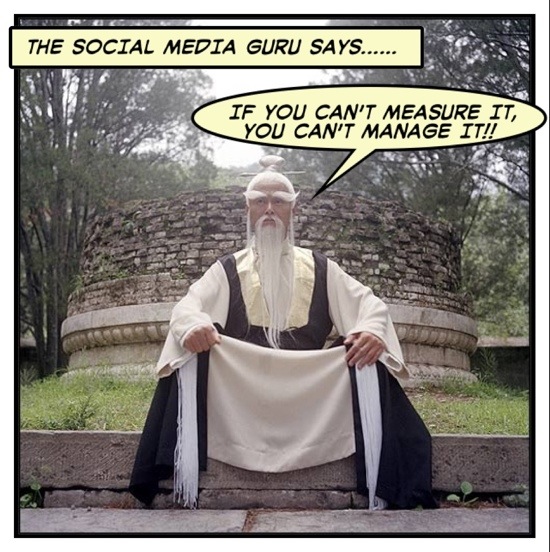Yes, yes, I know. Now, it’s clear that measurement is always good, if you can manage it (irony intended). I don’t deny that. And increasingly, the measurement of social media and online engagement is becoming more and more sophisticated. About 3 weeks ago I attended a social media for businesses conference and one of the talks was about social media measurement. I confess openly that I don’t remember much of it. It was so sophisticated, that within 15 minutes I was utterly lost in technobabble. Admittedly, the speaker was in quite a challenging position himself, having the task of explaining his entire life’s work in one hour.
Social media measurement (SMM) is a descendant of the web metrics of the 1990s/2000s. Its grandparents are pageviews and unique visitors. In the early days of SMM, say around 2010, this particular area seemed more like a poorly equipped wannabe trying to borrow some tools and tactics from its much older web metrics 師父 (shifu, or master). SSM was the proverbial poor boy servant who hid behind the walls secretly watching the kungfu students training with their master in the training yard, and tried to practise on his own in his little shed at night. Eventually, he would become very skilled, and even discover his own techniques.
That seems to be the story of SMM in very recent times. Empowered by ever-improving technology, the onward advance of sentiment analysis, no matter how far from 100% accuracy; with the constant tweaking of Facebook insights as a sign they aren’t satisfied yet, SMM is without doubt, growing and evolving, become more and more clever.
I suspect one day it will even defeat its former master.
I wrote recently about measuring community in non-technical ways. When I read exhortations like the one at the start of this post, I can’t help but feel a bit apologetic. The thing about technical, scientific, data-driven and data-producing measurements is that it always looks more accurate and defined than non-technical, anecdotal, subjective, emotive measurements. But of course, that’s the point. That’s why they were invented. Even if sometimes they give false impressions, they strike at the truth in terms we can measure and define.
I have no doubt that scientific SMM is important. If you can’t measure it, true, you probably can’t manage it. But what if you can’t even manage SMM? Or in some cases, social media itself? I’m afraid there is one other issue about SMM in Singapore – it’s being spoken in front of people who haven’t quite figured out social media itself. Many of us at the conference were confused. And I’m generally considered ahead of most. I’m not ashamed to admit it. I want to learn.
But in the meantime, businesses still have to survive. They have goals to meet. There is no point trying to tell businesses to adopt sophisticated SMM when they are still new at social media. It could – and probably more often than I care to admit – simply be a case of having management that doesn’t understand. Management that’s still bo(b)sessed with Big (Almost) Meaningless Numbers. Sorry, they exist, they really do.
Singapore is hardly at the forefront of social media. More and more people I meet have awakened to the reality that we are some 3-odd years behind the US. Everything from harnessing geolocation for business to mobile payments to webpage design, we are behind. Point: there may not be much point in measuring unsophisticated technology with sophisticated measures. Unless your management is ready and demands it.
I’m not trying to make Singapore social media sound bad. I’m just trying to figure out how best to help businesses and organizations move along. If you confuse your boss when you’re reporting your social media performance using sophistication, you’re playing with fire – a confused boss is often a frustrated boss. A frustrated boss will constantly ask you to justify and re-justify your social media plans and budget. Sound familiar yet? It’s my own personal experience. That’s why you must do your best to put your reporting in terms your boss understands.
Just as I said in that previous post, by all means learn about all these powerful SMM techniques, but don’t forget the language of the bosses: English.
